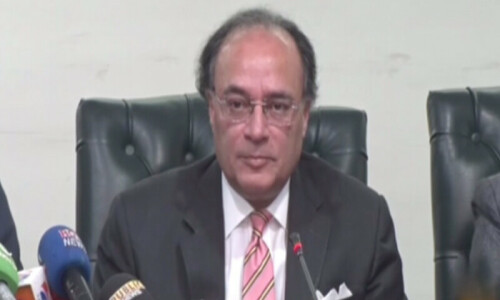FOR a party committed to change the Pakistan Tehreek-i-Insaf did something very conventional recently: it asked three men belonging to the same family to choose one of them for the PTI ticket in a Lahore constituency. Clearly, the individual did not matter, the biradri did.
NA-128 is a Lahore constituency that retains its link with the rural and, significantly, with tradition. In 2008, Afzal Khokhar won here beating his distant relative Karamat Ali Khokhar, then with the PPP, now with the PTI. Karamat’s nephew Zaheer Abbas Khokhar had won in 2002 on a PPP ticket and later joined the PPP-Patriots.
The members of the Khokhar biradri of Sistani and Shadiwal villages are once again arraying themselves on either side of the political Durand Line that has been most visible at the time of some recent elections. The Khokhars are a huge presence here. “We may be divided at election time, but we never forget that we are one family, the Khokhars,” says Malik Humayun Khokhar of Sistani. “Others recognise this and that is why even the old settlers refrain from challenging our might, and candidates.”
The election time division that Humayun talks about is manifestation of the existence within the biradri of groups with their own desires and power aspirations. This entail party affiliations since going independent purely on the biradri strength is not a feasible option, at least it is not the best option here. The parties have to be selected carefully and local alliances with smaller clans in the area — the Bhattis, the Meos and the Arain — subtly worked out.
With the emergence of new power players, the landscape in the area has also been changing. The onset of new housing colonies in the area forces ever newer political strategies. The new voters who occupy the housing societies that have come up over the years have to be wooed, even if the nucleus provided by family has to be jealously guarded. For these ‘settlers’ it is more a choice between parties — or more specifically a choice between a Nawaz Sharif and an Imran Khan — rather than a choice between one Khokhar or the other.
When Karamat Khokhar left after a long stay in the PPP, the switchover was justified on the basis of the PPP leadership’s disregard for his services. But the decision could well have been informed by an understanding that it was getting extremely difficult for the Karamat group within the Khokhar clan to effectively fight the rival Khokhars in the PML-N under the fading PPP banner. The rising PTI offered a more feasible option for a biradri looking for an ‘electable’ political party.
The PML-Q in 2008 is a good example of a collection of powerful individuals with not enough party appeal to succeed. Armed with the influence of their own biradri and its alliances with other clans in a particular area the Q-League’s ‘electables’ were defeated by opposing ‘electables’ who had the party-biradri balance right.
Back to NA-128 in Lahore, the area does bear witness to journalist Suhail Warriach’s remarks that while elections do divide the big biradris they can unite smaller ones. The smaller biradris here, such as the Arain and the Rangars, close ranks to get the best deal in the election: if not from candidates outside the Khokhar biradri for the simple reason that this option is not available to them right now, then from any of the two Khokhar groups.
Veteran Shakargarh politician Anwar Aziz Chaudhry says divisions in biradris are not a new phenomenon since biradri means blood relations who have disputes over land, marriages, etc. He says even a big biradri settled in a constituency generally does not form more than 50 per cent of the total votes. The rest of the voters belong to the smaller biradris which the candidates have to work for. Compromises are struck; sometimes in the shape of awarding of ‘choti’ or the provincial assembly seats or by offering other favours to create an inter-biradri alliance.
According to Chaudhry Anwar Aziz, the biradris are increasingly losing their structure. There is an exodus to towns to avail better facilities, and the more powerful a family is, the more likely it is that it will want to live in urban luxury. Intra-biradri marriages, he says, is the thread which still binds the clans.













































